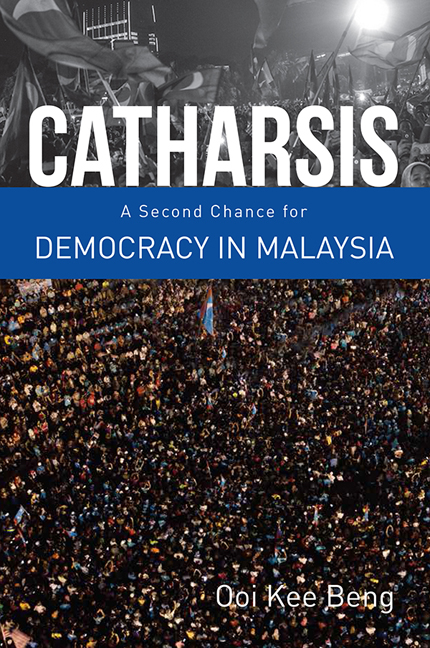Book contents
- Frontmatter
- Contents
- Foreword
- 1 Introduction – Malaysia's Future Is Redeemed
- Before Pakatan Harapan
- Before 9 May 2018
- 12 Racialising the Un-racialisable: What Is the Red Shirt Rally All About?
- 13 One Country's Merdeka Is Another's Damage Control
- 14 Malaysia – Where Politics Must Be Ethnically Inclusive and Exclusive at the Same Time
- 15 Is Malaysia at a Crossroads or in a Quagmire?
- 16 Unity Without Solidarity Sows Disunity
- 17 UMNO and Looking Back at History
- 18 Sarawak Forces Federal Opposition to Do Deep Soul-searching. But Can It?
- 19 By-elections Reveal New Malay Politics
- 20 Interview with Mahathir Mohamad: ‘People Must Be Able to Hold Their Heads Up.’
- 21 Malaysia Has to Start Re-examining Its Histories
- 22 Waves from US Probe into 1MDB May Turn into Tsunami
- 23 Seeking a New Formula to Unite Malaysia's Diversity
- 24 Time for Anwar to Accept Mahathir's Olive Branch?
- 25 Najib, Mahathir and the Timing of Malaysia's Polls
- 26 Excessive Governance Is Not Good Governance
- 27 Why Malaysia's Opposition Will Take to the Streets Again
- 28 Merdeka is About The Individual, Too
- 29 A Battle Between Malay Leaders Over Malaysia's Future
- 30 The Primacy of Political Economy in Asia
- With Mahathir at the Helm
- Beyond 9 May 2018
- About the Author
17 - UMNO and Looking Back at History
from Before 9 May 2018
Published online by Cambridge University Press: 12 February 2019
- Frontmatter
- Contents
- Foreword
- 1 Introduction – Malaysia's Future Is Redeemed
- Before Pakatan Harapan
- Before 9 May 2018
- 12 Racialising the Un-racialisable: What Is the Red Shirt Rally All About?
- 13 One Country's Merdeka Is Another's Damage Control
- 14 Malaysia – Where Politics Must Be Ethnically Inclusive and Exclusive at the Same Time
- 15 Is Malaysia at a Crossroads or in a Quagmire?
- 16 Unity Without Solidarity Sows Disunity
- 17 UMNO and Looking Back at History
- 18 Sarawak Forces Federal Opposition to Do Deep Soul-searching. But Can It?
- 19 By-elections Reveal New Malay Politics
- 20 Interview with Mahathir Mohamad: ‘People Must Be Able to Hold Their Heads Up.’
- 21 Malaysia Has to Start Re-examining Its Histories
- 22 Waves from US Probe into 1MDB May Turn into Tsunami
- 23 Seeking a New Formula to Unite Malaysia's Diversity
- 24 Time for Anwar to Accept Mahathir's Olive Branch?
- 25 Najib, Mahathir and the Timing of Malaysia's Polls
- 26 Excessive Governance Is Not Good Governance
- 27 Why Malaysia's Opposition Will Take to the Streets Again
- 28 Merdeka is About The Individual, Too
- 29 A Battle Between Malay Leaders Over Malaysia's Future
- 30 The Primacy of Political Economy in Asia
- With Mahathir at the Helm
- Beyond 9 May 2018
- About the Author
Summary
This year, 2016, is a special year for Malaysia. This is not because of the Sarawak state elections due in April (according to some sources); not because of the alarming economic situation facing so many already poor Malaysians today; nor is it because of the risk of a terrorist attack being foretold by external sources that are generally not given to be being alarmist. Neither is it because of the general reputation of the country hitting a new low following internationally noted scandals involving the prime minister.
The year is historical because UMNO, the party that has ruled the country since independence in 1957 and that has been the one to decide the direction of Malaysia's political thought for 60 years turns 70 years old.
The United Malays National Organisation is the result of a broad and passionate reaction to the Malayan Union – a post-war British policy that Malays saw as a move to colonise Malaya for good. What this turn of events also showed was how for over a century, the Malay community at large seemed to have strangely considered British control over most of the peninsula to be anything less than colonisation. In truth, British colonialism was often about economic control more than about direct exercise of power.
Importantly, colonial economics was a global phenomenon that involved the migration of peoples within the British sphere of influence. In the case of Malaya, colonialism started out with the securing of ports to create a trading route stretching from the Chinese coast all the way back to Europe. Over time and with the growth of the tin and rubber industries on the peninsula itself, the peninsula became a land of plantations and mines.
Peoples were moved as a policy to support these industries or they migrated voluntarily for work. And they came from far away, aided by the maritime infrastructure already in place. This resettling of people was essential to the growth of the colonial economy.
All this is part and parcel of the globalisation of the world over the last 500 years. The pretence kept up for seven decades by Malay rulers and the elite in concurrence with British strategies, limited their subjects involvement in globalising processes.
- Type
- Chapter
- Information
- CatharsisA Second Chance for Democracy in Malaysia, pp. 58 - 60Publisher: ISEAS–Yusof Ishak InstitutePrint publication year: 2018

